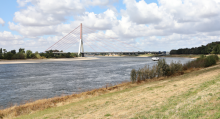Project name: iMolch - Sustainable water management concepts using innovative monitoring strategies
Project duration: 01.03.2023 - 28.02.2026 (3 years)
Funding organization: BMBF Fachprogramm Nachhaltige Grundwasserbewirtschaftung (LURCH)
Project number: 02WGW1667A–F
Contact person: Traugott [dot] Scheytt [at] geo [dot] tu-freiberg [dot] de (Prof. Dr. Traugott Scheytt)
Project partners:
Ruhr Universität Bochum: Prof. Dr. Tobias Licha, Dr. Peter Düppe, Dr. Thomas Heinze, Dr. Wiebke Warner
TU Berlin: Dr. Ferry Schiperski
Universität Duisburg Essen: Prof. Dr. Rainer Meckenstock, Dr. Verena Brauer
Stadtwerke Düsseldorf: Prof. Dr. Hans-Peter Rohns, Dr. Björn Droste, Anette Albrecht, Dirk Antunovic
GFI Grundwasser-Consulting-Institut GmbH Dresden: Prof. Dr. Felix Bilek, Jonas Jäckel
Groundwater is the most important source of drinking water in this country. However, falling groundwater levels and water levels in rivers are challenging existing utilisation concepts in Germany. The reasons for this are climate change and increasing demand for industry, agricultural irrigation and in urban centres. Increasing water consumption is accompanied by a higher volume of wastewater. The wastewater is treated. However, not all impurities can be removed, with negative consequences for the quality of surface waters and groundwater, which is often in direct contact with rivers and lakes.
In order to buffer fluctuations in quality and quantity, the management practice of aquifers must be optimised. The iMolch joint project is developing a comprehensive concept for the sustainable use of groundwater resources. It comprises three components: new monitoring tools for recognising short and long-term water quality problems. Secondly, models that depict the ecological status underground and predict water quality and available water quantities, and thirdly, strategies for groundwater management.
The smallest impurities in groundwater do not pose a health risk to humans. However, they contain important information about processes in the groundwater and conditions in the surface water that help to understand the functioning of the catchment area. Researchers are therefore investigating a broad spectrum of specific substances in groundwater bodies in various catchment areas. These include, for example, organic trace substances such as antibiotics, anti-allergic agents and pesticides or main constituents such as chloride. The project participants are also looking at hydrogeological parameters such as water levels as well as the activity and genetic diversity of living organisms in groundwater samples. The aim is to derive suitable indicators from this large number of test parameters that can provide information about the condition of the groundwater and the possible existing influence of human activity on the groundwater.
The scientists sample wells and measuring points in Düsseldorf and Dormagen in order to investigate particularly diverse catchment areas (industrial, domestic and agricultural). The measurements of various wells provide the necessary information on the change in groundwater quality under different conditions, for example during low water. The data collected feeds mathematical models that simulate the spatial and temporal distribution of pollutants and the ecological status of the subsurface. On this basis, forecasts of water quality and available water quantities are to be created. The forecasts will in turn be used to develop new utilisation concepts with the aim of minimising drinking water and groundwater pollution. This optimised management should enable the fair and sensible distribution of water use in the long term. After implementation in the project area, the approaches will also be reviewed and adapted at other locations.
